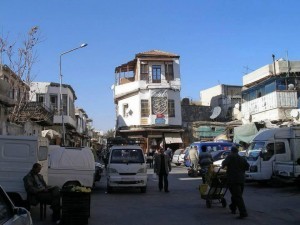The Remaining Jews of Damascus Isolate Themselves from Syrian Crisis

By Raheel Ibrahim *
(Damascus, Syria) – Sisters Firdaous and Sila live in a modest house with crumbling walls in the Amine neighbourhood of the old city of Damascus. They are two of the few remaining Jews in Syria, and the only ones left in Amine, which, along with the Jewish Quarter and the area of Qishleh in the old city, were historically Jewish neighbourhoods.
Although they are both over 60 years of age, neither sister intends to leave Damascus.
“I am happy,” said Firdaous. “I do not want to travel. We were born here, but I do not go out much. We are Jews.”

There are no statistics about the number of Jews remaining in Syria (the government does not publish demographic data on any sect) but reports indicate that the Syrian Jewish population was distributed between Damascus, Aleppo and Qamishli, and that most left after the regime lifted an emigration ban on all Jews in 1992.
Saleem, who asked his name be changed to protect his identity, is a prominent leader in the Jewish community. He says there are only 15 Jews left in Damascus, most of them elderly. The market in the Jewish quarter is now shuttered – it once teemed with life, its famous gold and silversmiths and tailors attracting Syrians from all over the country. The remaining shops are rented to non-Jews.
The small Jewish community of Damascus continues to worship on Saturdays and high holidays in the temple in the Jewish quarter, although there is no rabbi. When they need kosher meat, Saleem says, they bring a rabbi from Turkey to carry out the slaughter and then sell the meat only to other Jews.
Saleem says the Jewish Property Association is responsible for maintaining the homes of Syrian Jews who have left Syria. Some have been leased to Syrian non-Jews, while some Jews gave the head of the community the right to sell the properties and use the proceeds to renovate public Jewish buildings, such as the temple and the Ibn Maymoun School. The school used to be in charge of regular and religious education for Syrian Jews, but since the last big wave of emigration it has been converted into an office for the head of the sect.
Until 1992, the ban on emigration was the last remaining legality distinguishing Jews from other Syrian citizens. Under the late President Hafez al-Assad, Syrian Jews no longer had to have their identity cards marked with the word “Moussawi,” the official name for the sect, in red. Jews in Syria have been viewed with suspicion since before the Assad family came to power. Violence has also occurred, dating back to the 1949 bombing of Damascus’ synagogue.
The Syrian Jewish people who agreed to speak to the Damascus Bureau said they choose not to engage in politics while mourning the violence that affects all Syrians.
Only Saleem seemed to speak freely, boasting that he announces his Jewishness wherever he goes without trouble. When he passes through military checkpoints, he says, “I am a Jew,” and passes easily with a smile from the soldier.
“Maybe if it were a Free Syrian Army checkpoint they would kill me,” he says. He declines to say whether he supports the regime or not.
There have been no reports of Jewish Syrians being targeted by any of the parties to the conflict in Syria, but the Jewish temple in the Damascus suburb of Jobar, also known as Maqam al-Khodor, was subjected to shelling and looting in April during fighting between opposition forces and government troops.
Despite the on-going crisis in Syria and the small size of the Jewish community, this religious group has its own share of complex internal problems. Saleem, one of the community leaders in Damascus, accuses Albert Qamaou, a resident of the district of Qishleh, of corruption when it comes to administrating the affairs of the community and taking unilateral decisions.
Saleem says Qamaou’s actions violate the Cabinet decision of 2006 requiring each sect to appoint specific individuals to management positions within the community.
“The head of the sect conducts its affairs in secret,” says Saleem. “He is the accountant, the secretary and the treasurer,” he adds, noting that Qamaou oversees all financial transactions without referring to anyone else.
The Damascus Bureau contacted Qamaou to allow him to respond to these accusations, but he refused to comment, saying only, “I have orders not to give any statement or talk to the press specifically at this time.”
The Damascus Bureau later learned that as the official representative of the Jewish community in Syria, Qamaou requires approval from the security apparatus to make any statement. This is also the case of Saleem. Qamaou’s neighbours added that a foreign journalist made a similar request some time ago but he also refused.
Apart from the enforced security measures, most Jews of Damascus seem keen to remain hidden. Sila was born in Damascus and lived her whole life here, but she knows very little of the world beyond her local vegetable shop and the view from her doorway, where she sometimes sits to watch the passers-by.
* Raheel Ibrahim is the pseudonym for a journalist living in Syria.
